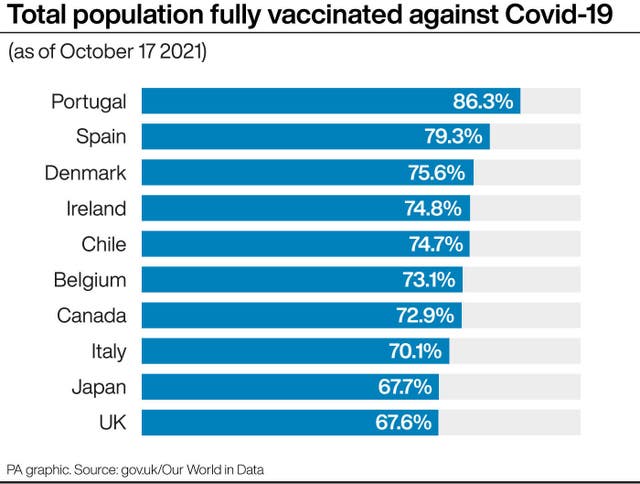Javid admits 999 and 111 call handler shortages ahead of ‘tough’ winter for NHS
Health Secretary Sajid Javid told MPs a winter plan developed with NHS officials will be unveiled in the next couple of weeks.

The NHS is facing a “particularly tough” winter and there are “shortages” of staff to respond to 999 and 111 calls, the Health Secretary has said.
Sajid Javid told MPs there is “huge pressure” on the health service in England as Labour also advised him to “ditch the complacency” and “fix” the Covid-19 vaccination programme.
Mr Javid insisted a winter plan developed with NHS officials will be unveiled in the next couple of weeks before he defended the jab rollout, amid concerns over a lack of uptake from youngsters.
Mr Javid replied: “There are shortages across the NHS – (Mr Hunt) has mentioned 999 callers, there’s a huge pressure at the moment on 111 calls as well and emergency care generally, including ambulance services.
“There’s a significant amount of support that has been put in, especially over the last few months, especially additional funding and we are setting out in a detailed plan coming shortly – in the next couple of weeks – with the NHS exactly what more we will be doing.”
At an earlier Health Select Committee hearing, chairman Mr Hunt said he had heard anecdotal reports of “very long periods of time being wasted for 999 calls to be picked up, sometimes as long as 10 minutes, which obviously if someone’s having a cardiac arrest is far too long”.
NHS England chief executive Amanda Pritchard said there had been a “very significant increase in demand” and part of the answer was “the recruitment and training of additional call handlers to respond to that increase in demand”.
Pressed on the issue, she said “we do need to have more capacity in that call handling part of the process”, adding: “It’s part of the £55 million that we’ve given to ambulance services to help them now invest in additional resilience over the winter period.”
She added that the NHS is in for a “tough winter” and a rise in Covid patients would have an effect on how much other, planned care could be carried out.
He said: “This is an NHS not just under pressure but an NHS under water. What is he personally going to do to avert a winter crisis of misery for patients?”
Mr Javid replied: “We can all see this wherever we live, our constituents are seeing this.
“It is picking up over the winter and usually winters are tough for the NHS but this winter, I think, is going to be particularly tough and the Government has set out the reasons why – the pandemic is still ongoing, this flu season will be particularly tough, I think, and that’s why we’re having, for example, the largest flu vaccination programme alongside the Covid programme this year.”
Mr Javid said extra money is being put into the NHS, before noting: “We are going to set out very shortly with the NHS a detailed programme for the winter and how we can better deal with the pressures.”
Labour’s Mr Ashworth went on to raise concerns over the level of Covid infections nearing 50,000 a day, adding: “On every single day of the last three weeks, 10,000 children have been diagnosed with Covid, the booster programme is stalling, with charities describing it as a ‘chaotic failure’, only around 13% of children have actually been vaccinated – his wall of defence is falling down at just the point that vaccination is waning.
“Can I suggest he ditches the complacency and fixes the vaccination programme now?”
Mr Javid defended the UK’s vaccination programme as “one of the most successful in the world”, adding: “It has prevented 24 million infections, it’s prevented some 230,000 people from being hospitalised and 130,000 lives have been saved.

Outside the chamber, Downing Street acknowledged coronavirus hospital admissions and death rates are rising along with infections but insisted ministers do not need to resort to Plan B of the winter plan yet.
The Prime Minister’s official spokesman said “some groups” are coming forward “slightly more slowly” for their third jabs than they did for their previous shots.
He added: “We have seen case rates rising, we’ve started to see some indications that hospitalisations and death rates are increasing also.
“Clearly we’re keeping a very close eye on rising case rates, the most important message for the public to understand is the vital importance of the booster programme and indeed for those children who are eligible to come forward and get their jab.
“We’re seeing some groups come forward slightly more slowly than they did perhaps when they were getting their first or second vaccination and it’s important that the public understand that getting your booster jab is just as important as getting your first and second dose and we need individuals to come forward because it is a huge benefit to them and wider society.”
Asked if the Cabinet discussed rolling out Plan B of the plan to control the virus this autumn and winter, the spokesman said: “No… It remains the case we would only look to use that if the pressure on the NHS was looking to become unsustainable.”





